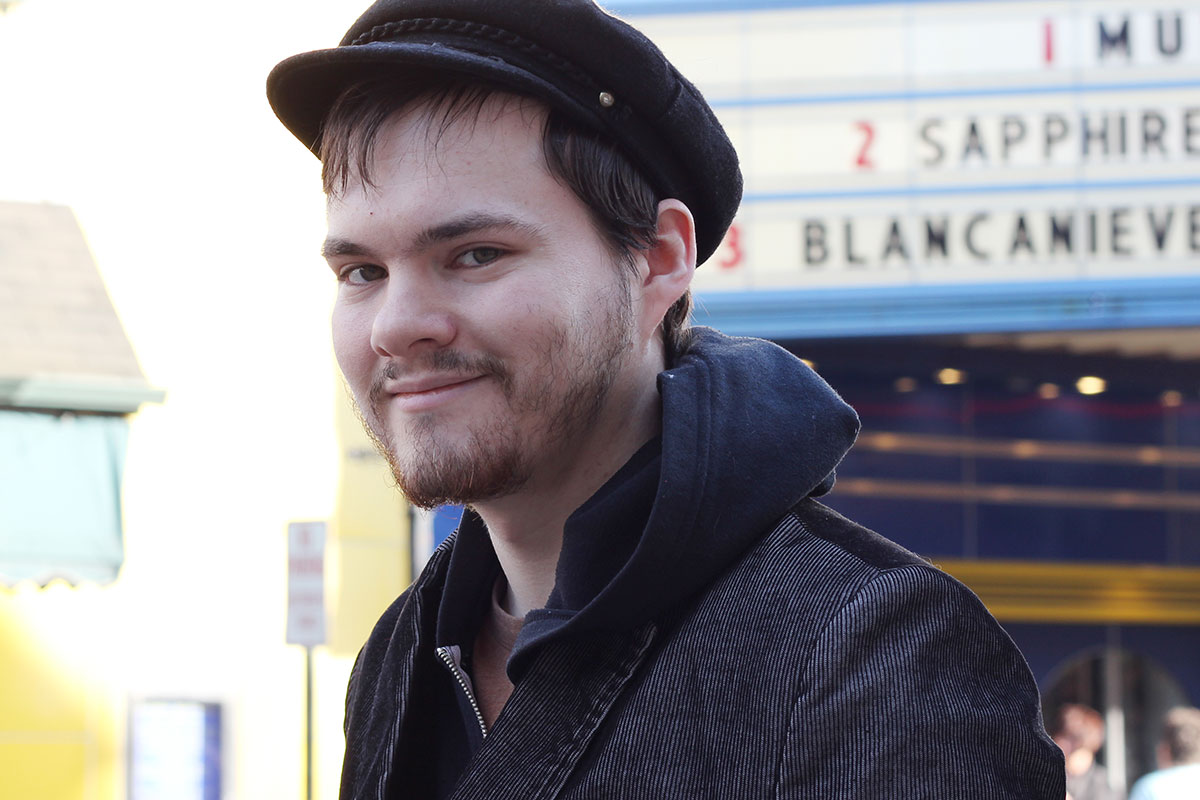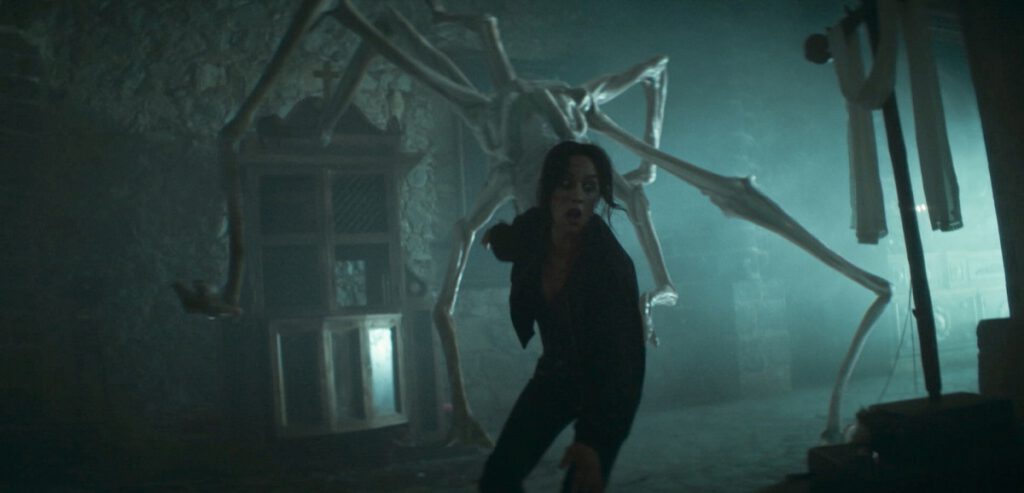There’s an argument to be made that there is no one who knows the power of a memorable opening quite like Álex de la Iglesia. His 1995 film “The Day of the Beast” opens with a priest going on a spree of petty sins: stealing a dying man’s wallet, knocking over a street performer and stealing from a beggar. His 1997 Barry Gifford adaptation “Perdita Durango” opens with a leopard undressing Rosie Perez. “The Last Circus,” perhaps his best work, opens with a clown pressed into fighting in the Spanish Civil War. His 2013 comedy “Witching and Bitching” opens with an armed robbery, in which a man dressed like Jesus gets away with thousands while his accomplice, SpongeBob Squarepants, is gunned down in cold blood. “30 Coins,” now premiering episodes weekly on HBO Max, has three opening scenes and they’re so fantastically tasteless and loaded you might burst out laughing or put your head between your knees.
The first has a man robbing a Swiss bank, getting filled with bullets by security but not dying until he’s in the getaway car when an intense priest in sunglasses removes a charmed necklace from the culprit. Then the magnificently depraved opening credits depict the crucifixion of Jesus Christ while cackling Romans laugh at his torment and a guilty Judas flees the scene to go hang himself. And finally a cow gives birth to a human fetus in a little town deep in the Spanish hinterland. Most storytellers like to play God. Álex de la Iglesia exalts in playing the Devil.

“30 Coins” is the kind of thing I can imagine de la Iglesia and his longtime co-writer Jorge Guerricaechevarría having dreamt of making from the time of their feature debut, 1993’s “Mutant Action.” Over the years they’ve created a world recognizably and uniquely theirs, ruled by secret societies and beset by biblical chaos; their style a crispy plait of Luis Buñuel and Alex Cox. They peddle a Catholic version of the Cosmic Horrors of William Hope Hodgson and H.P. Lovecraft. As in the work of those authors, the universe occasionally opens up and swallows a few mortals, but it’s usually got something to do with the God of the New Testament than inter-dimensional octopi. It often feels like Vatican II was a cover-up to make it seem as though religious order was loosening its restrictions on the world while behind closed doors more nefarious things were transpiring in secret. In this specific regard “30 Coins” is sort of the crowning work of their theological texts, a dense and ebulliently blasphemous mystery, and it’s stuffed with more incident than the entire run of some telenovelas.
The three openings of “30 Coins” quickly come into sharper focus as the baby born of a cow matures in the series premiere. The man who robbed the Swiss bank? A patsy for a religious sect with a single-minded goal: collecting the 30 coins paid to Judas to betray Jesus, as depicted in the deliciously vulgar credits. Elena the veterinarian (Megan Montaner) goes looking for help after delivering the baby, first from Paco (Miguel Ángel Silvestre), the Himbo mayor of her small town, then from newly appointed priest Father Vergara (Eduard Fernández). He’s quick to dismiss the events as the product of overactive imaginations, but Elena can sense he’s lying. Something weirder is afoot. Elena leaves the child in the care of a recently bereft older couple but only two days later they’ve become disturbed by the child, which grows four or five feet in height overnight. Vergara will only reveal his knowledge of the plague upon them in small doses as sights so strange they can only be the product of a web of supernatural malevolence begin popping up with shocking regularity. They include but are no means limited to: men returning from the dead, possessed little girls, gigantic John Carpenter-esque man-spiders, haunted mirrors, and satanic witches.

Iglesia’s best work is ruled by suggestive images, rather than necessarily exacting compositions. He’s been more of a motion and momentum-defined filmmaker, which is why his most memorable images are a blur of action, simulating the turning of a pulp paperback’s page at lightning speed to get to the next trespass. That nimble delivery helps drill through the mountain of incident he and Guerricaechevarría have dreamt up; each episode contains something so profound and weird it alone could be the plot of a single movie. Fittingly, the writers have managed to create a number of different kinds of television show at once, from a “Twin Peaks”/“Andy Griffith Show”-derived study of a town in crisis, to a Shonda Rhymes-style political soap opera, and finally a fountain of supernatural goings-on as in monster-of-the-week offerings like “Buffy the Vampire Slayer” or “The Venture Brothers.”
The creators are well aware that they’re dipping their quills in well-used ink and that knowing attitude becomes part of the fun of “30 Coins.” Take the character of Vergara. The idea of a priest-with-a-past is itself such a tremendous cliche that they go hog wild in the retreading. He’s not just a holy man who smokes cigarettes like Constantine, he’s also a former heavy weight boxer with a closet full of machine guns. The whole show is like that. It’s not just that there’s a religious conspiracy, it goes so deep it would upend the whole of the faith if it were unearthed. Lingering beneath the extramarital passions, misbehaving teens, corrupt cops and clergymen, the world might just be on the brink of destruction, but nothing’s inherently more important than anything else. It would be flippant in anyone else’s show to suddenly get dropped in Aleppo, Syria for an episode. Here it makes perfect sense.
I’ve heard complaints lobbed at the show that it isn’t as thoughtful as some of Guerricaechevarría and de la Iglesia’s previous work, and I have to disagree. “30 Coins” is predicated on a clever and cunning idea I wish was more frequently explored in more self-consciously cool “religious” art. This might constitute a minor spoiler, but it doesn’t concern any character in the show so much as it does the ideas underpinning the whole endeavor: the villains here are dark clerics trying to collect items possessed of the lingering power of the betrayal of god. In one scene it’s explained that they want to prove that Judas was part of the plan for Jesus to be crucified, making him just as integral a figure to the resurrection and thus the whole of the gospels as Jesus Christ himself. It’s explained in such a way to make it sound as though the whole idea of Evil in the world is something that is also then just as divine as an act of charity. In short: can anything be good without evil? It’s the kind of thing that preoccupies so much of the national discourse, albeit in bowdlerized and distractingly byzantine form. Do we need there to be horrifying things in the world to prove the true value and power of empathy and selflessness?
It’s a question that cuts to the heart of human nature. It’s buried under sex, violence, and conspiracies, but “30 Coins” is interested in what degree of malice that people should be allowed to exhibit. Everyone in the little town where Elena, Vergara, and Paco live has a dreadful secret waiting to be exposed, which makes them all highly susceptible to the satanic goings-on. They hope to save everyone from a web of apocalyptic danger but the fight for everyone’s souls was over before it started. Guerricaechevarría and de la Iglesia have made some of the most memorably outré films of the last 30 years, but they make just as much sense on the small screen, where they can lob crazy incidents like a pitching machine. “30 Coins” is hardcore appointment television. Even at a run-time in excess of eight hours this season races by and leaves you desperate for the devil’s next move.
Seven episodes screened for review.












